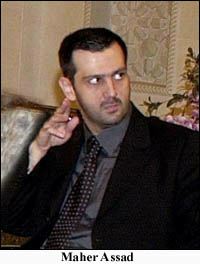 |
| Vol. 4 No. 2 | Table of Contents MEIB Main Page | February 2002 |
 |
American Warships Monitoring Sea Traffic to Syria
On January 27, naval vessels from the US Sixth Fleet searched two Syrian-registered ships off the coast of Cyprus. "These operations are intended to deny the Mediterranean to anyone who would use it for any activities related to terrorism," said the US European Command in Germany two days later. Although no contraband was found on board, the two ships, Hajji Rahma and Capitaine Muhammad, had displayed "suspicious behavior" and were under surveillance for two weeks, during which they docked at a Turkish port.
In September, Turkish authorities intercepted a truck en route to Syria and seized an estimated 1,100 lbs (500 kg) of sodium cyanide, an important precursor for the manufacture of chemical weapons. Since then, sea and land-based shipping from Turkey to Syria have been closely monitored.
On February 1, the Syrian Foreign Ministry issued a statement condemning "the act of piracy which the Sixth Fleet carried out in the Mediterranean against two Syrian commercial ships carrying citrus fruit."
Trials of Opposition Leaders, Media Law Condemned by HRW
New York-based Human Rights Watch issued a statement on February 12 calling for the "immediate and unconditional release" of ten opposition leaders arrested by the Syrian authorities in August and September 2001, and condemning a September 2001 press law which imposes harsh penalties on journalist who publish "false" information. "Syria had begun to move in the direction of opening up political space and permitting serious debate about the country's future," said Hanny Megally, executive director of the Middle East and North Africa division of Human Rights Watch. "Now we are seeing democratic activists on trial or in detention, and intimidating legislation that gives authorities the tools to shut down newspapers and prosecute and imprison journalists and writers."
Two members of the Syrian parliament, Mamoun Homsi and Riyad Sayf, are currently on trial in civilian courts. Eight other detainees, including Communist Party Political Bureau (CPPB) leader Riyad al-Turk and economist Aref Dalila, have been referred for trial to the supreme state security court.
European diplomats have attended the trials of Homsi and Sayf, and there are reports that the Syrians have been told that sentencing the activists to long prison terms might endanger the signing of an association agreement between Syria and the European Union (EU).
EIB to Provide New Loans to Syria
A senior executive of the European Investment Bank (EIB) announced on February 3 that the EIB will provide Syria with a loan of 165 million euros ($142 million) to supply the country with medical equipment. According to Jean-Louis Biancarelli, the EIB director-general of operations outside the EU, plans are also underway for the provision of a 45 million euro loan to develop the Syrian port of Tartous and a 20-25 million euro loan to develop small and medium-sized commercial enterprises. Efforts to fund the development of telecommunications, road networks and environmental protection projects "are in the pipeline," said Biancarelli.
The EIB resumed the provision of loans to Syria in late 2000, following an eight-year hiatus, after Syria signed an agreement with Germany to reschedule its debt. In 2000 and 2001, the EIB provided three loans, totaling 210 million euros, for electricity projects in Syria.